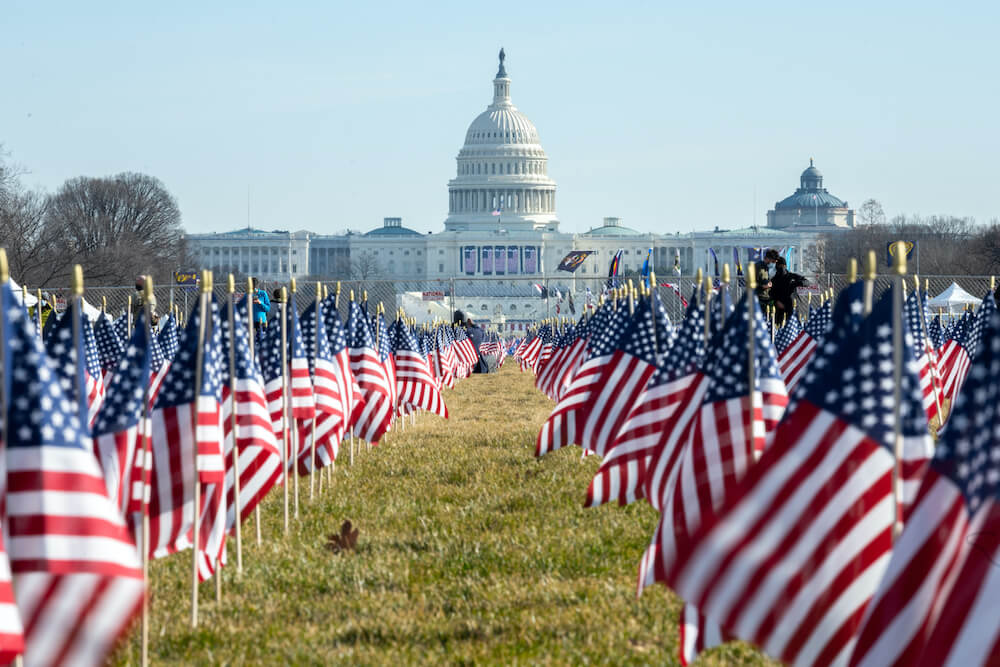March 1, 2020

Becoming One Nation Against COVID-19
COVID-19 is now the nation’s leading cause of death. [1] Hospitals and healthcare workers are stretched to and beyond capacity. Mutating, faster-spreading coronavirus strains pose a grave danger to the public’s health. Even with the disease spread slowing and vaccinations increasing, the next few months will be critical in determining how the nation recovers from the pandemic.
The U.S. will need to vaccinate 75 to 85% of all Americans to achieve herd immunity and fully reopen society. That translates into vaccinating almost 250 million individuals, most with two doses. Administering half a billion vaccinations is a massive logistical challenge.
Biden’s COVID-19 team is pursuing an ambitious “National Strategy” to manufacture, distribute and administer enough vaccines to theoretically achieve herd immunity this year. That is half the battle. The other half of the battle is winning the hearts and minds of enough Americans to get the disease under control.
Documentary film maker Ken Burns describes the COVID-19 pandemic as the 4th and perhaps worst great crisis in American history — after the Civil War, the Great Depression and World War II. [2] The U.S. is more politically divided than any time since the Civil War. Public distrust bred through misinformation and fragmented news sources makes unifying the country exponentially more difficult. Winning enough American hearts and minds will not be easy.
Anti-vaxxers are diverse, not really even a group. Understanding the different pictures in their heads is essential to developing strategies that address their individual and collective reluctance to take vaccines. Rational arguments only go so far.
Effective appeals are emotional, informed by stories, have champions and role models. They appeal to civic and group pride. They create a sense of shared sacrifice for the greater good.
To earn the public’s support, Biden has appointed himself to be the Administration’s communicator-in-chief for COVID-19 conversations with the American people. This passage from his inaugural address captures Biden’s belief that only unity can lead America to a brighter future:
To overcome these challenges, to restore the soul and secure the future of America requires so much more than words. It requires the most elusive of all things in a democracy: unity, unity…
…History, faith and reason show the way, the way of unity. We can see each other not as adversaries, but as neighbors. We can treat each other with dignity and respect. We can join forces, stop the shouting and lower the temperature. For without unity, there is no peace, only bitterness and fury. No progress, only exhausting outrage. No nation, only a state of chaos.
…We must set aside politics and finally face this pandemic as One Nation. One nation.
Biden’s rhetoric is compassionate, forward looking and action oriented. This is the essence of persuasion. By acknowledging current suffering and describing a brighter post-COVID future, Biden invites Americans to come together as one people to suppress the pandemic and revitalize their communities.
The question is whether the country will follow Biden’s leadership and rise to the challenge. As he closed his inaugural address, Biden laid down the gauntlet.
…we’re going to be tested. Are we going to step up? All of us? It’s time for boldness, for there is so much to do…Will we rise to the occasion, is the question. Will we master this rare and difficult hour? Will we meet our obligations and pass along a new and better world to our children?
Combatting COVID-19 is a gigantic logistical and political undertaking. Biden has gone to war footing to get COVID-19 under control. Having enough vaccines to achieve herd immunity, however, will mean little if too many Americans refuse to trust their leaders, practice constructive public health behaviors and get vaccinated. Unifying the American people to fight a common viral enemy is Biden’s defining political challenge.
The next six months will shape the national destiny for the foreseeable future. Beating COVID-19 has the potential to reboot the nation’s dysfunctional politics, reestablish fact-based political discourse and create a more conducive environment for fixing America’s broken healthcare system. Failure to control the virus will lead to greater political and economic dislocation. The pandemic’s ultimate outcome is in the hands of the American people.
Abraham Lincoln noted in an 1854 debate with Stephen Douglas that “public sentiment is everything. With public sentiment, nothing can fail; without it nothing can succeed.” [3] As Lincoln might advise Biden today, national immunity from COVID-19 cannot occur without national unity against COVID-19.
SOURCES





